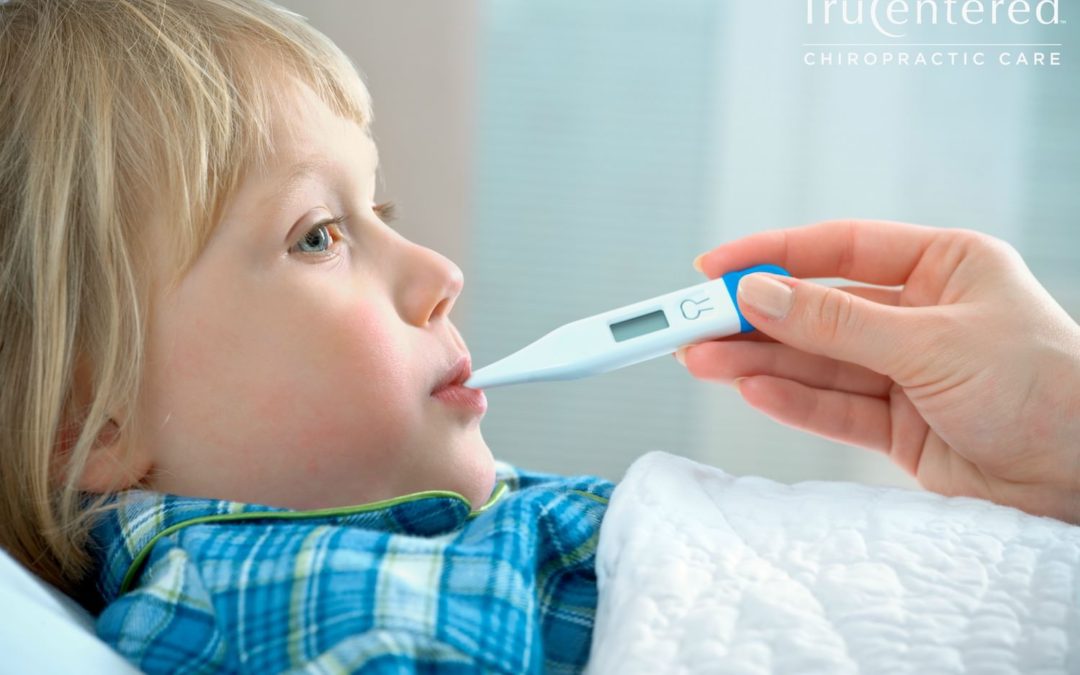Fever is a tricky topic, especially when it comes to our kids.
The fall months are upon us bringing cooler temperatures, reduced time outdoors, and less sunshine… this also means a higher incidence of fever and illness for our family members.
One of the most common questions I get from patients is “What should I do about my child’s fever?”
WHAT IS A FEVER?
It is an increase in body temperature compared to the average temperature.
This elevation is a natural response and can be commonly caused by exposure to a virus or bacteria and less commonly attributed to heat stroke, poisoning or other factors.
The most important piece of information every parent needs to understand is that FEVER IS A NORMAL RESPONSE.
When the body increases temperature it is a purposeful part of the healing process.
IS FEVER DANGEROUS?
The answer to this question is at the root of why the majority of parents are fearful of their child having a raging fever.
One problem is that the temperature is not an indicator of how “bad” an illness is.
Your child or grandchild could have a temperature of 102 and be completely fine while in other cases, the temperature could be much lower and they’re suffering from something serious.
The main issue that typically drives a caregivers intervention is seeing our little ones struggle or experience discomfort. No parent enjoys that! There’s no question, if you’ve seen your little one struggling, burning up and crying… it’s a natural instinct to want to help them.
But… by decreasing the body’s response to an impending infection, you’re doing more harm than good. It’s not the temperature that is a problem; it’s the underlying problem that is the issue.
So…how high is too high?
To put your mind at ease even the National Institutes of Health states that fever under 107 degrees is unlikely to cause brain damage and febrile seizures although scary do not cause any permanent harm.
Even the most conservative medical authorities agree 103-105 degrees for relatively short periods are not a problem at all.
That said, there are rare cases where your child’s fever is a sign of a more serious problem. Cases such as:
- Respiratory distress
- Temperatures over 100 in kids under 3 months
- Stiff neck or listlessness
- Known poisoning
- Fever for multiple days
WHAT SHOULD YOU DO ABOUT YOUR CHILD’S FEVER?
For the vast majority of cases, the answer is nothing.
At least nothing other than make your child feel comfortable. Artificially attempting to lower the body temperature will inhibit the body’s immune response and alter the natural healing process.
This applies to medication as well as cold compresses and tubs. When you take a different (and scientifically correct) perspective on fever, you recognize it is a mechanism for the body to enhance it’s immunological response. It’s part of the healing process.
My advice…pay attention to your child, NOT their fever. ? Are there other symptoms, are they listless, are they able to communicate? ?
The point is… the elevated temperature is on purpose. And unless it’s a signal something more serious is happening, getting out of the way is the best approach to ensuring they move along the healing process as fast as possible and end up healthier as a result.
Monitor your child, support their functioning body with water, nutrient dense foods if hungry, rest and give them plenty of attention and love.
No doubt, we won’t enjoy the process and neither will they. Yet, one thing is for sure… saving intervention and medication for only when required will allow their developing immune systems to get stronger and in the long run, they’ll be better for your decision to trust and support the body.
This is an important article that can help thousands of parents and grandparents just like you start to understand how to best address a child’s fever intelligently and confidently.
Please share it with anyone you think it could benefit.
If you want more of the steps every parent needs to know in order to keep their child healthy, click below to download the FREE resource guide.
Dr. Derek Gallant
Dr. Derek Gallant has committed himself to helping others live the best life possible. After graduating from Wesleyan University, he received his Doctor of Chiropractic Degree from Life Chiropractic College West where he finished 2nd in his class. He is the owner of Beverly Family Chiropractic and co-founder of The Well Family Foundation. Dr. Gallant is certified through the International Chiropractic Pediatric Association (ICPA) in the Webster technique, an analysis focused on assisting pregnant women in a healthy pregnancy and natural birth. He has inspired thousands of people to take control of their own health using the Life By Design method. Apart from full time practice you can find Derek at the parks and coffee shops around Beverly with his family, training hard at the gym, or at the beach surfing.









